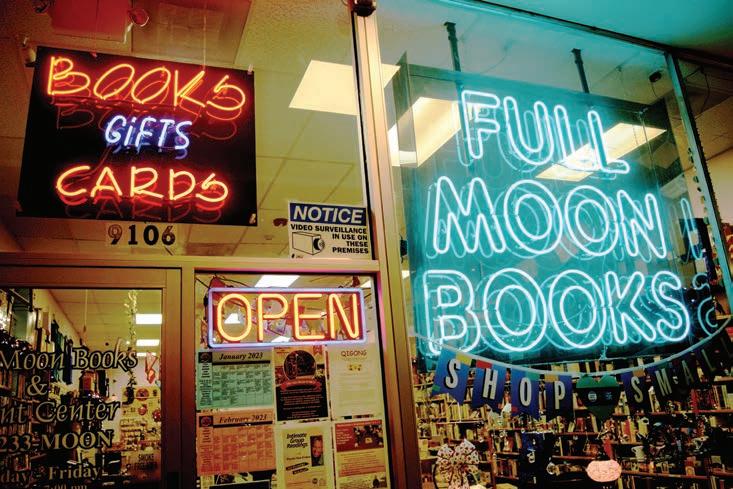
14 minute read
Soaring utility bills provoke questions about our energy future
Colorado has had a chilly winter compared to recent decades, but the larger question triggered by the rising utility bills is how the state’s 5.8 million residents will stay warm in coming decades. I see this story as being mostly about the future of natural gas.
Utility bills from November and December that in many cases were double those of the previous year have outraged many Coloradans.
Much of the heat was vented at Xcel Energy, the state’s largest utility with 1.4 million gas customers and 1.5 million electric customers. Black Hills Energy has 192,000 customers and Atmos has 120,000 customers. Other residents are served by municipal utilities or, particularly in rural areas, burn propane.
Natural gas explained 80% of the increase on an average utility bill, according to research by the Colorado Public Utilities Commission sta . Gas prices surged, caused largely by supply disruptions caused by Russia’s war against Ukraine. Prices have now moderated, but were responsible for 34% of bill increases.
Uncommon cold explained another 30%, according to the PUC sta research. For example, temperatures at Denver’s Central Park averaged 8 degrees colder than the year prior — which, by the way, was the second warmest since recordkeeping began in the 1930s. e station was then called Stapleton Airport.
Russ Schumacher, the Colorado climatologist, says heating degrees days, a measure of the energy needed to heat buildings, rose 30% at Central Park. Xcel said its customers in Colorado used 35.5% more gas in November and 31% more in December than in the same months in 2021. It was the coldest winter in Denver in more than 20 years. is nancial pain was evident this week at the statehouse when Gov. Jared Polis introduced several consumers. One woman said her family had commonly gone to the mountains on Saturdays, but could not now because her husband was working Saturdays to pay for the higher utility bills. Others talked of lowering thermostats but were still being shocked by their bills.

Some customers also started paying for Winter Storm Uri in February 2021, the week-long deep freeze, whose utilities had insu ciently hedged their contracts. ey paid through the nose, and those costs are now being passed along to consumers.
For Xcel, the high bills were being paid just as company o cials informed shareholders that Colorado had delivered pro ts of 8.23% in 2022. at’s not exorbitant. Utilities commonly do as well or better. In the compact with states, they get monopolies, score high on reliability — and never take a loss. But this had produced calls for Xcel and other utilities to get more “skin in the game.”
Adding outrage was news that the PUC had allowed Xcel to pass along $2 million it had paid to lawyers and expert witnesses in supporting its argument for raised consumer rates. is equals the entire annual budget for the O ce of Utility Consumer Advocate, a state agency of seven people charged with representing consumers in
LINDA SHAPLEY Publisher lshapley@coloradocommunitymedia.com
A publication of

Call first: 143 S. 2nd Pl., Brighton, CO 80601
Mailing Address: 750 W. Hampden Ave., Suite 225 Englewood, CO 80110 Phone: 303-566-4100
Web: WestminsterWindow.com
To subscribe call 303-566-4100 is unusual. However, COVID hit land development quite hard. As I recently wrote, one of the reasons new office developments are somewhat “iffy” is based on the desires of many employees wanting to continue working at home.
Westminster’s Community Development Department has a reputation in the metro area of being tough on developers. Certainly, some toughness is needed. I don’t know what the deal breaker was on either of the two land sales, but we will nd out in court. Aside from the facts, the situation that two somewhat similar lawsuits landed in the news within approximately 30 days does raise eyebrows.
Parking enforcement is big business
With the City of Westminster getting in the business of providing vehicle parking at two parking structures a few years ago, it begged the question who would enforce the parking regulations.
First, the city hired a private rm to handle enforcement. LAZ handled enforcement at an annualized cost of $536,924.
SEE CHRISTOPHER, P13
Letter To The Editor
Cheaper water plant not a good deal
Some members of Westminster City Council seem thoroughly pleased with themselves for having apparently knocked $100 million o the estimated cost of the replacement city water treatment plant (Westminster Window, Feb. 16). ey are not quite so forthcoming about what is lost in the process. e original Water 2025 plan called for a plant capacity of 60 million gallons/day (MGD), intended to accommodate the full anticipated build-out of the city. e majority of Council rejected this approach and directed sta to ‘rightsize’ the proposed facility to 44 MGD, ensuring that the new facility would serve only the existing, not the probable future, needs of the city.
Other ways in which costs were removed from the plan are the removal of both ozonation capability (needed to address wild re damage to the water supply) and granular activated carbon (to treat for emerging contaminants such as PFAs). Apparently we should not plan for future growth, and should also wait for a wild re or contaminant to damage our water supply before thinking of adding those capabilities.
What is not at all surprising is the number of Westminster city councilors who gained their seats in the 2021 election largely by promising residents that they would slash water/sewer rates. And indeed they did, to a level that (a) sent the message that in this time of incipient or actual drought they could continue to use more than 46,000 gallons of water to tend their inappropriately thirsty properties and (b) allowed the irresponsible reduction in the capabilities of the much-needed water treatment plant.
Watch this space, as they say, to see how soon we can point to reasons to ask `What were they thinking?’ Of course, when the time comes that city buildout has overcome the capacity of the new ‘rightsized’ plant, requiring millions more in building costs, or misplaced frugality has given us no protection against wild res or contaminants, who will remember that—e ectively—this is what they voted for?
Chris Stimpson, Westminster
MICHAEL DE YOANNA Editor-in-Chief michael@coloradocommunitymedia.com
SCOTT TAYLOR Metro North Editor staylor@coloradocommunitymedia.com
LUKE ZARZECKI Community Editor lzarzecki@coloradocommunitymedia.com
LINDSAY NICOLETTI Operations/ Circulation Manager lnicoletti@coloradocommunitymedia.com
ERIN ADDENBROOKE Marketing Consultant eaddenbrooke@coloradocommunitymedia.com
AUDREY BROOKS Business Manager abrooks@coloradocommunitymedia.com
ERIN FRANKS Production Manager efranks@coloradocommunitymedia.com
Columnists & Guest Commentaries
Columnist opinions are not necessarily those of the Window.
We welcome letters to the editor. Please include your full name, address and the best number to reach you by telephone.
Email letters to staylor@coloradocommunitymedia.com en, in early 2022, the city chose to take this function “in-house” using city employees. Now, with the 2023 City Budget adopted, we can see what the cost is for Community Development to administer parking enforcement and maintenance at the two parking structures as well as taking over the responsibility to do on-street parking enforcement. Previously, the Police Department had provided on-street enforcement. A part of that time, Code Enforcement Division was a part of the Police Department and performed on-street parking enforcement. is whole endeavor raises questions in my mind. Was it necessary to go to paid parking when the city sta previously pushed the concept? Was parking enforcement pre- mature for both key development areas? Does it discourage retail and business development? Today, is an $839,000 expense the best use of these city funds? How do the businesses at the New Downtown feel about the paid parking requirement?
Deadline Wed. for the following week’s paper.
Let me set the stage for the increased budget of this city function. e 2020 budget was $608,012. In 2021, it was $685,550 while 2022 came in at $629,383. For 2023 with ve city employees carrying out the various functions, the budget jumped to $839,180. It should be pointed out that the on-street parking enforcement was in the Police Department budget prior to 2023 so the 2023 Community Development budget is skewed to some degree. e reason I share this information is to “prime the pump” for some fundamental questions.
Does Westminster need an o -street parking enforcement program?
In conjunction with both the Downtown Westminster plan and the train station plan, parking management was a part of the total operational plan.
I would concur with that thinking, but what about the timing of implementing it? According to city sta , the Downtown Westminster parking garage averages 350-450 “parking sessions” per day. e city did not track such “sessions” during the time of COVID. Also, with the apartment complexes, the city states there are approximately 200 parking permit holders (residents and employees) for the Downtown garage.
In the case of the train station parking, sta noted that pre-COVID numbers were 250-300 vehicles per day. ey do not have reliable gures during COVID or since then, but the number has not returned to pre-COVID amounts. Also, the previous city council authorized on-street paid parking which was implemented at both the New Downtown and the RTD train station.
For the boutique hotel, I can see the need in the parking lot adjacent to the hotel given the need for overnight parking of guests. City sta indicated that they thought getting an “early jump” on implementing the paid parking was a smart idea.
Does the paid parking cover the operating costs?
A fundamental question for the “bean counters” and policy-setters is whether or not the revenues derived from the paid parking covers the operating expenses? e answer is simple. According to sta , an estimated $100,000-$115,000 in annual revenue is expected versus the $839,000 expense. is means taxpayers are subsidizing the parking enforcement program by over $700,000 each year. While I would not expect the revenues to begin to cover the costs, I would expect the gap to be smaller from a scal prudency standpoint.
I hope you will ponder the statistics provided regarding the level of usage as well as the net cost of the program. Do you think this program was and still is premature?
Representative Greene Is A Disgrace
What ever happened to decorum in the U.S. House of Representatives? We saw poor conduct when Donald Trump was president and we have seen it two years in a row with President Joe Biden. Seldom does the President of the United States speak before Congress. When he does come to give the State of the Union address, I would hope and think that professional decorum would prevail regardless of political di erences.
Last year, Representatives Lauren Bobert and Marjorie Taylor Greene showed their lack of professional courtesy yelling out. is time Greene yelled out that President Biden was a liar. I nd such conduct unacceptable and demeaning. Representative Greene is a disgrace to America! ank Heavens she is not my U.S. Representative. American political behavior has sunk to a new low.
Bill Christopher is a former Westminster city manager and RTD board member. His opinions are not necessarily those of Colorado Community Media. You can contact him at bcjayhawk68@gmail.com.
FROM PAGE 12 cases before the PUC. Passing along such costs has occurred for decades or longer. Despite precedent, it’s a valid question to ask whether an imbalance exists. Polis, in his remarks at the Capitol, seemed to agree. e broad question is whether we should, as Polis suggested, shift energy use to renewables that in theory will not be vulnerable to global price swings. One bill got preliminary nod by a House committee this week
In the short term, we can expect legislation that will require Xcel and other utilities to hedge in the natural gas markets. ink of this as being like insurance, with an up-front cost that prevents big, big bills.
About Letters To The Editor
Colorado Community Media welcomes letters to the editor. Please note the following rules: would require home warranty service contracts to allow homeowners to replace gas-fueled devices with those powered by electricity. ere has also been pushback to this drive to electri cation that one legislator from southeastern Colorado dismissed as consisting of “rainbows and unicorns.” at remark came during a discussion of a bill that proposed to prevent local jurisdictions from banning combustion of fossil fuels. Colorado has a sole precedent for such bans. Crested Butte last summer passed a law preventing use of natural gas in the remaining 100-some lots in that town to be developed.
• Email your letter to letters@coloradocommunitymedia.com. Do not send via postal mail. Put the words “letter to the editor” in the email subject line.
• Submit your letter by 5 p.m. on Wednesday in order to have it considered for publication in the following week’s newspaper.
• Letters must be no longer than 400 words.
• Letters should be exclusively submitted to Colorado Community Media and should not submitted to other outlets or previously posted on websites or social media. Submitted letters become the property of CCM and should not be republished elsewhere.
• Letters advocating for a political candidate should focus on that candidate’s qualifications for o ce. We cannot publish letters that contain unverified negative information about a candidate’s opponent. Letters advocating for or against a political candidate or ballot issue will not be published within 12 days of an election.
Allen Best writes about Colorado’s energy and water transitions at the reader-supported e-journal Big Pivots. See more at BigPivots.com.
• Publication of any given letter is at our discretion. Letters are published as space is available.
• We will edit letters for clarity, grammar, punctuation and length and write headlines (titles) for letters at our discretion.
• Please don’t send us more than one letter per month. First priority for publication will be given to writers who have not submitted letters to us recently.
• Submit your letter in a Word document or in the body of an email. No PDFs or Google Docs, please.
• Include your full name, address and phone number. We will publish only your name and city or town of residence, but all of the information requested is needed for us to verify you are who you say you are.

• Letters will be considered only from people living in Colorado Community Media’s circulation area in Adams, Arapahoe, Clear Creek, Denver, Douglas, Elbert, Je erson and Weld counties.
• Do not use all caps, italics or bold text.
• Keep it polite: No name calling or “mudslinging.”
Residents of Westminster since 1969 born Lindsborg Kansas BA from Bethany college 1956. Taught 1st grade in Kansas. Work child care for CCD Tech West. She and her husband Dean owns Swensens ice cream in Northglenn for 21 years. ey had 4 children Deanne, Mark, Karen and Kathy. 7 grand children 5 great grandchildren. Her brother
Gary Gabrielson lives in Co Springs. She had dementia for 7 years. She died peacefully with her family around her and in lieu of owers donations can be made to Alzheimer’s Association or Fish Food Bank. Service at Westminster Presbyterian Church on February 25th at 11:00.


Speed dating events in metro Denver o er alternatives to swiping
BY NINA JOSS NJOSS@COLORADOCOMMUNITYMEDIA.COM
On a ursday night in late January, dozens of people walked past displays of tarot cards and crystals towards a dim room at the back of Full Moon Books in Lakewood. A man at the room’s entrance asked them each to remove their shoes. e smell of burnt sage lled the air.

For a while, people mingled. e event was not to start until 7 p.m., and stragglers arrived until moments before the doors closed. When it was time, a woman wearing a pink velvet robe asked everyone to sit in a circle.
“For all the new people, this is where we’re all going to get naked,” the woman joked. Everyone laughed, and she continued, “ ere will be none of that. is is just a really fun, safe event.”
Danny Neifert, a facilitator of an event called Tantra Speed Date, was playing with the stereotypical understanding of the word “tantra.” For many people, the term brings sex to mind. Although tantra is a spiritual practice that includes sexuality, Neifert said it has more to do with connection.
“Tonight, for the sake of simplicity, we’re just going to swap out the word ‘tantra’ with ‘connection,’” she said to the group. “It’s about connecting to yourself, connecting to the person that’s standing in front of you, connecting to the room, connecting to the building, the soil, the snow, the stars — you ll in the blank in a way that makes sense to you.” is event is one of several forms of speed dating in the metro Denver area, where singles are stepping out of their comfort zones to nd hope, chemistry — and maybe even love — beyond the screens and swiping of modern dating.
For the next several hours, the attendees took turns rotating from person to person, doing mindful activities with a new partner at each station. At one, a partner mirrored the others’ physical actions. Next, strangers gave each other back massages. Some stations involved speaking — about gratitude, letting go or joy — and at others, people danced.
Paying attention
Guy Shahar is a founder of e Tantra Institute, a New York-based company that aims to help people become “better lovers” through sacred sexuality. e company teaches courses about sexuality, tantra and relationship skills, in addition to hosting events like Tantra Speed Date.
Since 2017, Tantra Speed Date has hosted over 550 events in 40 cities for attendees of all ages.
“Most of the stations are really just about (giving) people instructions that show them how to put their attention on each other,” Shahar said about the speed dating event.
In his eyes, lack of attention is the number one challenge people face in modern dating, partly because of technology and partly because of the number of potential partners.
“A hundred years ago, who could you date? e people from your neighborhood, the people around you,” he said. “Now you can date anybody in the world… You open up any of those dating apps and you could be swiping on a di erent person in less than a second.”
His speed dating event, he said, is designed to put people in situations where they must focus on each other.
“Like a mirroring exercise, right?” he said. “I’m watching you, and I’m responding to what you’re doing… My attention is on you… Getting people to bring their attentions to each other is a really beautiful way to fool them into connection and intimacy.”
Once people surrender to paying full attention, Shahar said it’s easier to tell if there is chemistry between them.
After the initial connection, Shahar said other things become important as a relationship continues.
“ at connection isn’t necessarily compatibility,” he said. “You might have an amazing connection, or let’s say amazing chemistry… but their habits might be totally not compatible with yours. If you want a sustaining relationship, then you need to nd some points of compatibility or you need to be able to work with habits.” at being said, Shahar thinks having the opportunity to initially sense a connection is a powerful way to see if there’s any potential with a person.


“(To) just start your relationship o with that kind of intimacy and connection just seems like a really great, really beautiful way to get yourself o on the right foot,” he said.
Is a few minutes enough?
For speed dating skeptics, it may seem improbable that a person could have any sense of real connection after an encounter that lasts only a matter of minutes.

Dr. Randi Smith, a practicing psychologist and psychology professor at Metro State University Denver, said a few minutes might not be enough to tell a lot about a potential partner –but it can show some things.
“ ere’s some really recent research that suggests that we’re able to pick up on somebody’s relationship anxiety, their attachment anxiety, in a very brief interaction,” she said. “So can we predict whether this relationship will have legs, whether it will have a future? Probably not, but we might be able to weed out some people whose anxiety might prevent them from having a good relationship with us.”
In addition, Smith said quick interactions can give people a sense of physical attraction and even immediate emotional attraction based on how it feels to talk to a potential partner.
On a deeper psychological level, she said people at speed dating events are probably thinking about reciprocity of liking. is idea is that people tend to like those who like them.
“Speed dating is very strategic, right?” she said. “You have little time, you’ve got to gure out how to make these choices, and so our brains are going into high strategic, albeit









